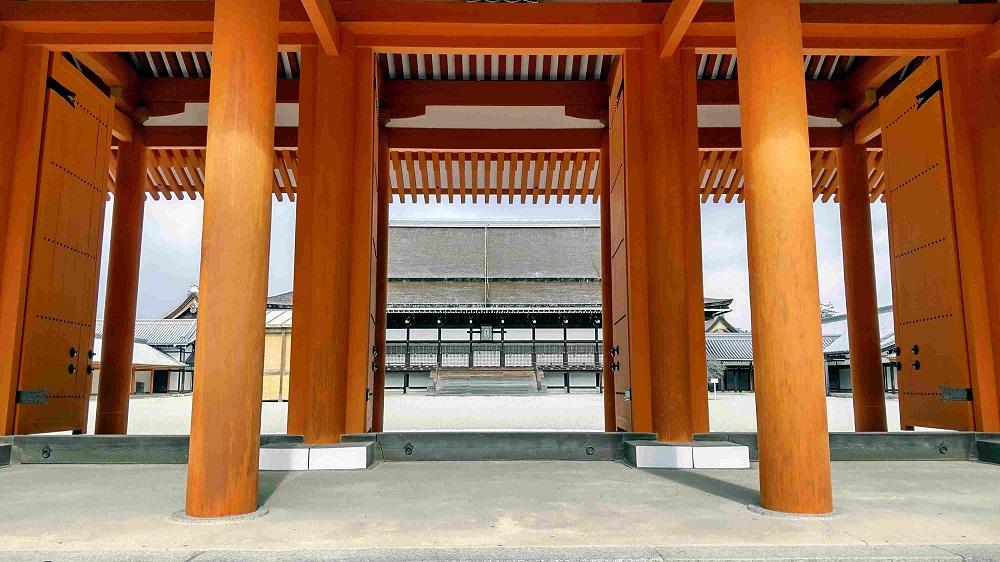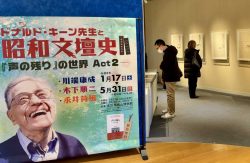
The Shishinden (Hall for State Ceremonies), rear, in the Kyoto Imperial Palace in Kamigyo Ward, Kyoto
17:55 JST, February 20, 2023
“The Tale of Genji,” an expansive court novel set in Kyoto in the early 11th century, is in part the story of protagonist Hikaru Genji’s career advancement.
Genji begins as a vice-minister in the Imperial guard and rises through the ranks to become a minister, then head minister, and finally reaches a position equivalent to that of emperor. For some reason, however, there are no scenes in the tale in which he performs political duties.
What exactly does he do then? He composes poems and attends banquets, where he plays musical instruments and dances. He falls in love with ladies of the court and even temporarily flees Kyoto for one of his forbidden loves. Nevertheless, he rises through the ranks at an incredible speed.
Perhaps he comes to prominence because of his skill in singing, dancing and musical performances. That is to say, it was believed that such pastimes were how aristocrats occupied themselves in the Heian period (794 to late 12th century), and that this was why they lost power to the samurai based in Kamakura, in present-day Kanagawa Prefecture.
In fact, the belief that aristocrats were living a life of fun and play spread in later generations because of Japanese literary works written by women, such as “The Tale of Genji” and “The Pillow Book,” a collection of poetic essays also written in the Heian period.
In recent years, however, this image has been completely overturned as diaries written exclusively in Chinese characters by aristocrats of the time have been more closely analyzed.
While Hikaru Genji is a fictional character, “The Pillow Book,” written by Sei Shonagon, contains the names of several aristocrats who were contemporaries of Hikaru Genji but actually existed. One of them, Fujiwara no Yukinari, is depicted as a man who exchanged witty banter with Sei Shonagon that could be read as flirtation, but Yukinari’s own diary, “Gonki,” reveals that there was much more to his life.
In the March entry of his diary for the year 1000, Yukinari, who held a position similar to that of today’s chief cabinet secretary, writes that he worked from March 1 to 6, took one day off, and then worked into the night for three days in a row starting March 8. At such a pace, he managed to work a total of 26 days during the month. Of those days, there were 12 when he worked into the evening hours. He was almost always at the court to handle paperwork.
According to Prof. Kazuhiro Kuramoto of the International Research Center for Japanese Studies, “Yukinari was not only capable but also loyal and diligent, which made him even busier.”
The day for aristocrats would begin around 3 a.m. to 4 a.m., before sunrise, to the sound of a drum being beaten at the Imperial palace. They would pray, check the day’s fortune, dress themselves and arrive at work by the second beating of the drum, which was made about 45 minutes after sunrise.
They generally worked in the morning but had to stay if they were on night duty.
“The court meetings almost always lasted late into the night, sometimes for as long as 10 hours,” Kuramoto said.
A jimoku, a kind of personnel meeting held in front of the emperor, would take three days because of the complicated rules.
Fujiwara no Michinaga, thought to be one of the models for Hikaru Genji, was the head of the government at the time when Yukinari was active, and played a key role in these meetings. But, in his later years he became ill from over work.
Hikaru Genji, then, must also have been working hard to reach such heights of courtly success, even if the novel is more absorbed in his lovers’ trysts.
Top Articles in JN Specialities
-

Tokyo University of the Arts Now Offering Free Guided Tour of New Storage Building, Completed in 2024
-

Exhibition Shows Keene’s Interactions with Showa-Era Writers in Tokyo, Features Newspaper Columns, Related Materials
-

Step Back in Time at Historical Estate Renovated into a Commercial Complex in Tokyo
-

The Japan News / Weekly Edition (1/30-2/5)
-

Prevent Accidents When Removing Snow from Roofs; Always Use Proper Gear and Follow Safety Precautions
JN ACCESS RANKING
-

Japan PM Takaichi’s Cabinet Resigns en Masse
-

Japan Institute to Use Domestic Commercial Optical Lattice Clock to Set Japan Standard Time
-

Israeli Ambassador to Japan Speaks about Japan’s Role in the Reconstruction of Gaza
-

Man Infected with Measles Reportedly Dined at Restaurant in Tokyo Station
-

Videos Plagiarized, Reposted with False Subtitles Claiming ‘Ryukyu Belongs to China’; Anti-China False Information Also Posted in Japan





















